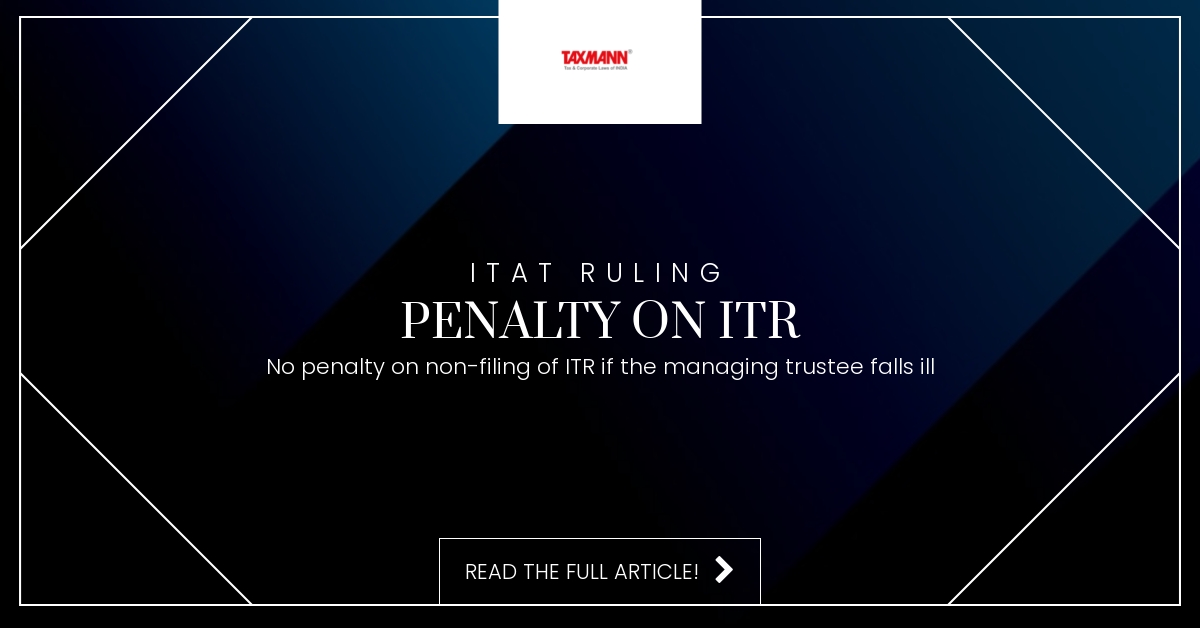No penalty on non-filing of ITR if the managing trustee falls ill: ITAT
- Blog|News|Income Tax|
- 2 Min Read
- By Taxmann
- |
- Last Updated on 5 April, 2022

Case Details: National Institute of Women Child & Rural Health Trust v. JCIT - [2022] 136 taxmann.com 261 (Chennai - Trib.)
Judiciary and Counsel Details
-
- Mahavir Singh, Vice President and G. Manjunatha, Accountant Member
- S. Sridhar, Adv. for the Appellant.
- G. Johnson, Addl. CIT for the Respondent.
Facts of the Case
The assessee was a charitable trust registered under section 12AA of the Income-tax Act, 1961. For the assessment year 2010-11, the assessee had not filed the return of income in time. The Assessing Officer (AO) initiated penalty proceedings under section 272A(2)(e) and called upon the assessee to show cause as to why the order imposing the penalty should not be passed.
The assessee submitted that the Managing Trustee was falling ill from the year 2006 and up to the assessment year 2010-11, which had resulted in the delayed filing of return of income. However, AO was not convinced by the explanations and held that the ill health of the managing trustee does not come under reasonable cause. Accordingly, he levied the penalty under section 272A(2)(e) for failure to file the return of income.
On appeal, the CIT(A) upheld the order of AO. Aggrieved-assessee filed the instant appeal before the Tribunal.
ITAT Held
The Chennai Tribunal held that AO himself had recorded a finding that medical records submitted by the assessee show that Managing Trustee was suffering from illness for the period 2010-11. Illness of the Managing Trustee of the trust during the relevant period will come under reasonable cause as provided under section 273B for not filing the return of income within the due date specified under the Income-tax Act.
Assessee neither intentionally filed return of income belatedly nor derived any benefit by filing belated return. In fact, the assessee had an excess of expenditure over income for all these years. Thus, there was no loss of revenue to the Government by not filing return of income within the due date specified under the Act.
Accordingly, reasons given by the assessee for not filing return of income within the due date specified under section 139(4A) come under reasonable cause for not levying penalty under section 272A(2)(e).
Disclaimer: The content/information published on the website is only for general information of the user and shall not be construed as legal advice. While the Taxmann has exercised reasonable efforts to ensure the veracity of information/content published, Taxmann shall be under no liability in any manner whatsoever for incorrect information, if any.

Taxmann Publications has a dedicated in-house Research & Editorial Team. This team consists of a team of Chartered Accountants, Company Secretaries, and Lawyers. This team works under the guidance and supervision of editor-in-chief Mr Rakesh Bhargava.
The Research and Editorial Team is responsible for developing reliable and accurate content for the readers. The team follows the six-sigma approach to achieve the benchmark of zero error in its publications and research platforms. The team ensures that the following publication guidelines are thoroughly followed while developing the content:
- The statutory material is obtained only from the authorized and reliable sources
- All the latest developments in the judicial and legislative fields are covered
- Prepare the analytical write-ups on current, controversial, and important issues to help the readers to understand the concept and its implications
- Every content published by Taxmann is complete, accurate and lucid
- All evidence-based statements are supported with proper reference to Section, Circular No., Notification No. or citations
- The golden rules of grammar, style and consistency are thoroughly followed
- Font and size that’s easy to read and remain consistent across all imprint and digital publications are applied



 CA | CS | CMA
CA | CS | CMA
